German Far Right Gains in Bellwether Election, but Fails to Sweep

© Leon Kuegeler/Reuters


© Leon Kuegeler/Reuters


© Ina Fassbender/Agence France-Presse — Getty Images


© Pool photo by Ben Stansall


© David Guttenfelder/The New York Times


© Sarah Meyssonnier/Reuters


German Chancellor Friedrich Merz escalated his criticism of Russian President Vladimir Putin, calling him “perhaps the most serious war criminal of our time” in an interview with Sat.1 television, according to ntv.
“He is a war criminal. He is perhaps the most serious war criminal of our time that we are currently seeing on a large scale,” Merz said in the interview. “And we must simply be clear about how to deal with war criminals. There is no place for leniency here.”
The CDU leader’s characterization represents a new level of personal condemnation of the Russian president. While Merz has previously accused Russia as a state of “serious war crimes” and “terrorism against the civilian population” during his tenure as chancellor, his direct personal labeling of Putin as potentially the era’s worst war criminal marks an unprecedented escalation in his rhetoric.
The comments come as international legal proceedings against Putin continue. In March 2023, the International Criminal Court issued an arrest warrant for the Russian president in connection with the illegal deportation of children from Ukraine.
The arrest warrant has complicated diplomatic efforts. Austria’s Foreign Ministry recently stated the country would be willing to host negotiations between Ukrainian and Russian leaders to end the war. Vienna indicated it could conduct consultations with the International Criminal Court to coordinate issues regarding Putin’s arrest warrant and avoid his detention during any potential visit.
Merz’s remarks reflect the ongoing international debate over how to engage with Russian leadership while war crimes proceedings remain active. His insistence that “leniency” has no place in dealing with war criminals signals Germany’s hardening stance toward diplomatic accommodation with Moscow.
The interview represents one of the strongest personal condemnations of Putin by a major European leader since Russia’s invasion of Ukraine began.


In a report on 31 August, the Institute for the Study of War (ISW) outlined how the Kremlin has intensified its multi-pronged information campaign to weaken Western support for Ukraine and derail the European role in peace efforts in the ongoing Russo-Ukrainian war.
Russia is now aggressively pushing three narrative lines at once: blaming European states for prolonging the war, reviving nuclear threats, and portraying Russian victory as inevitable.
Kremlin officials have returned to a long-standing propaganda line that paints European states as obstacles to peace in Ukraine. ISW noted that Kremlin spokesperson Dmitry Peskov and Russian Direct Investment Fund (RDIF) CEO Kirill Dmitriev recently implied that European countries are deliberately extending the conflict. According to ISW, Russia is using Dmitriev—who frequently represents Kremlin interests on Western platforms—to reintroduce this message into the Western media environment, aiming to erode US confidence in European allies.
On 31 August, Russian Security Council Chairperson Dmitry Medvedev launched a pointed attack against French President Emmanuel Macron and German Chancellor Friedrich Merz. Posting on his English-language X account, Medvedev accused the two leaders of having “forgotten the lessons” of World War II. He warned that “things could end up like they did in 1945 – [Macron and Merz] too may end up being identified by their teeth,” directly invoking the atomic bombings of Hiroshima and Nagasaki. Medvedev also described recent Russian military progress as “bad news” for the European leaders.
ISW assessed that this language is intended to threaten France and Germany with nuclear consequences for their involvement in US-led efforts to end the war, while simultaneously amplifying the idea of unstoppable Russian military momentum.
Alongside these threats, the Kremlin continues to push the idea that Russian victory in Ukraine is certain. ISW reported that the Russian Ministry of Defense has ramped up its efforts to project battlefield success using large volumes of qualitative data. However, ISW assessed that these claims are inflated and part of the broader strategy to demoralize Ukraine’s allies and reduce Western resolve.


German Chancellor Friedrich Merz warned that Ukrainian capitulation would lead to Russian aggression against other states, according to his interview with ZDF channel.
Merz said the war between Russia and Ukraine could continue for an extended period. “We are trying to end it as quickly as possible. But certainly not at the price of Ukraine’s capitulation,” he added.
The Chancellor explained that while the war could end tomorrow if Ukraine surrenders and loses its independence, such an outcome would have dangerous consequences. “Only then the day after tomorrow it will be the turn of the next country. And then the day after that it will be our turn. That is not an option,” Merz said.
The German leader emphasized his government’s position on avoiding Ukrainian surrender despite the war’s potential duration.
Regarding the possibility of a ceasefire next year, Merz expressed cautious optimism: “I don’t give up hope that we can make it happen. But I’m also not deluding myself.”
On the question of ground troops in Ukraine, Merz opposed such deployment at present. “Nobody is talking about ground troops in Ukraine at this time,” he said.
This interview follows Merz’s earlier statements on Ukraine. On 27 August, the Chancellor argued that Ukrainian capitulation would only give the Russian dictator time to prepare for a new war. Two days later, on 29 August, Merz said Russia’s war against Ukraine could last “many months” as Putin refuses negotiations.


German Chancellor Friedrich Merz warns that Russia’s war against Ukraine could continue for “many months” as Vladimir Putin refuses to engage in negotiations, Guardian reported on 29 August.
Merz made these comments during a meeting with French President Emmanuel Macron, questioning Putin’s commitment to peace talks. The German chancellor said that initial discussions centered on organizing a bilateral summit between Putin and Ukrainian President Volodymyr Zelenskyy within two weeks, but the Russian leader “clearly unwilling” to proceed with this timeline.
“Frankly, this doesn’t surprise me, because it’s part of the Russian president’s strategy to proceed in the same way,” Merz said.
The chancellor emphasized the need for coordinated action within what he termed the “Coalition of the Willing” to increase pressure on Russia and force Moscow to return to the negotiating table.
Merz’s assessment builds on his recent statements regarding Russian tactics. On 26 August, he suggested that Moscow was deliberately stalling by linking any potential Putin-Zelenskyy meeting to specific conditions. The following day, the German chancellor argued that Ukrainian capitulation would only provide Putin time to prepare for future conflicts.
The comments reflect growing European concern about the prolonged nature of the war and questions about Russian willingness to engage in meaningful diplomatic efforts.
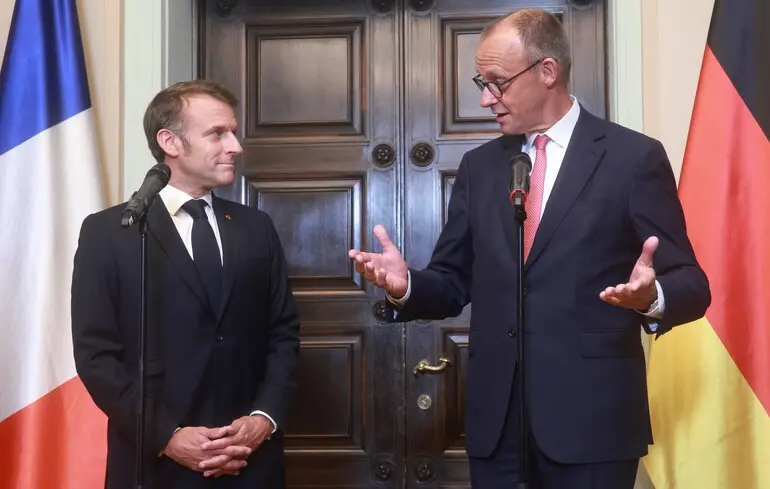

German Chancellor Friedrich Merz and French President Emmanuel Macron announced plans for secondary sanctions targeting companies from third countries that support Russia’s war effort, as European leaders grow impatient with the stalled peace negotiations.
The initiative emerged from a meeting of German and French cabinet members on 29 August, according to Bloomberg. Both leaders called for measures to undermine Russia’s ability to finance its military operations through oil sales.
“We will continue to exert pressure for additional sanctions to be imposed by ourselves — and we are prepared to do so — but also by the US, to force Russia to return to the negotiating table,” Macron said at a joint press conference with Merz at Fort du Cap Brun near Toulon.
The timing reflects mounting frustration with President Donald Trump’s approach to ending the war. Trump’s latest two-week deadline for progress is close to expiring with little visible advancement toward a peace deal. Instead, the Kremlin launched one of its heaviest drone and missile assaults of the year this week, hitting apartment buildings and killing at least four children.
Merz specifically referenced potential US tariffs as a model for action. “In America, right now they’re discussing further tariffs,” he said. “I would welcome it very much if the American government could make a decision on enforcing those on other nations whose purchases of oil and gas finance a large part of Russia’s war economy.”
The Franco-German statement outlined plans to “further extend and develop effective and robust sanctions” through cooperation within the European Union and with Group of Seven partners. The stated goal is to “exert maximum pressure on Russia.”
The EU has already begun preparing secondary sanctions aimed at Russia’s energy sector. These measures target third countries that help the Kremlin circumvent existing penalties, with additional steps planned for Russia’s oil, gas, and financial sectors.
“We are working on the next package, there are several options on the table,” EU foreign policy chief Kaja Kallas said. “Of course, what will hurt them the most is any sanctions on energy and secondary sanctions.”
The EU adopted an anti-circumvention tool in 2023 that prohibits exports, supply, or transfers of certain goods to third countries considered to aid sanctions evasion. However, the bloc has not yet deployed this instrument.
The EU has avoided secondary sanctions, particularly given recent criticism from the Trump administration about such policies. The current push suggests European leaders believe they have reached the limits of direct sanctions against Russia.
Merz has become increasingly vocal about the lack of diplomatic progress. The German leader said on 28 Augusthe no longer expects a meeting between Putin and Ukrainian President Volodymyr Zelenskyy, despite Trump’s previous suggestions that such talks were possible.
Beyond sanctions, France and Germany agreed to provide Ukraine with “credible security guarantees” that would allow the country to maintain a military “without any limitations” to deter Russia. They also committed to closer defense cooperation and standardizing military equipment between their nations.
The two countries plan to discuss including France’s nuclear weapons in Europe’s overall security architecture, though they postponed a final decision on the troubled FCAS fighter-jet project until year-end.
Kallas indicated broad support among EU defense ministers for expanding the mandate of EU training missions after a ceasefire, allowing training to occur inside Ukraine rather than just outside its borders.
Zelenskyy said he and European leaders will “connect” with Trump next week to discuss security guarantees during meetings where he seeks legally binding commitments from allies as part of peace negotiations.
Macron and Merz plan separate calls with Trump over the weekend, according to Bloomberg.
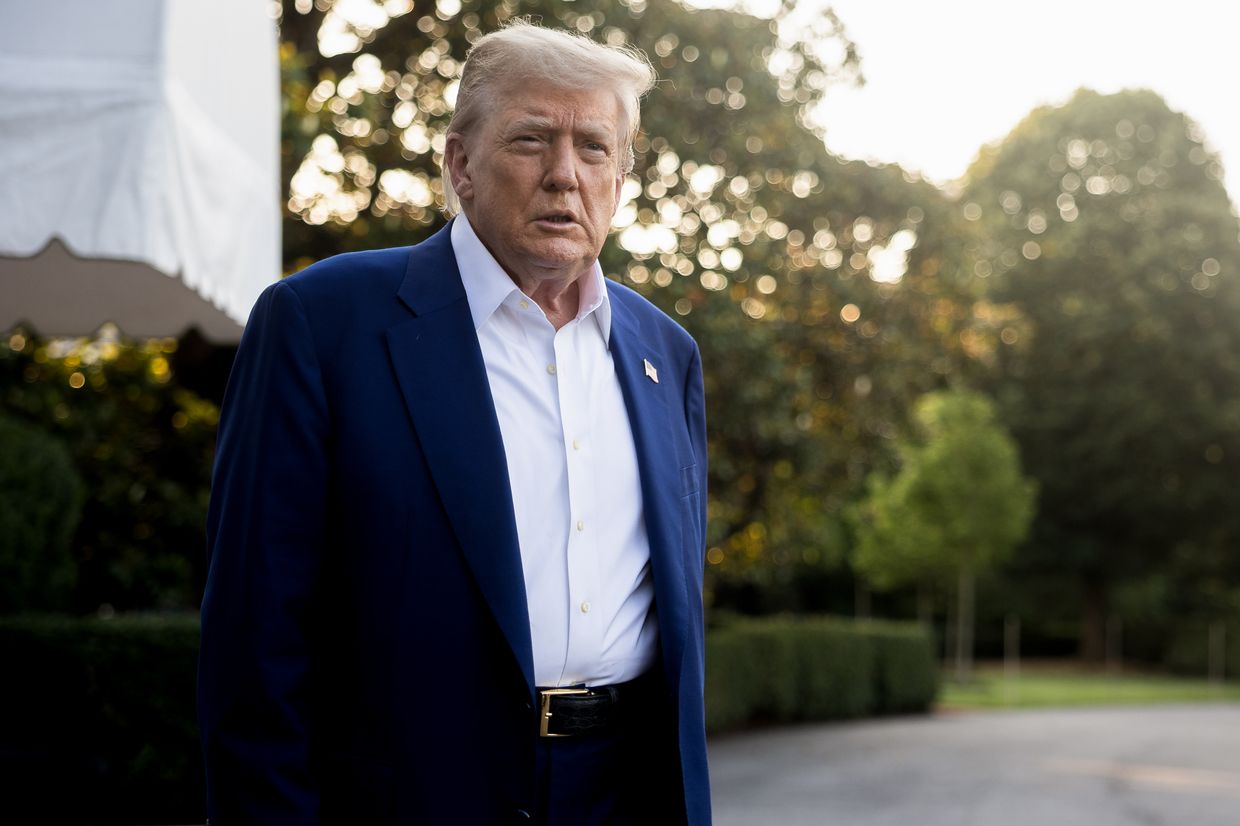

U.S. President Donald Trump has promised to send 10 Patriot interceptors to Ukraine - a smaller number than had been paused previously while en route to the country, Axios reported on July 8, citing its sources.
Trump has also suggested that Germany sell one of its Patriot batteries to Ukraine, according to three sources cited by Axios. They said the U.S. and European allies would split the cost of the purchase.
The discussion comes as Ukraine is calling upon its allies, particularly the United States, to support Ukrainian air defense by supplying "life-saving" Patriot systems and relevant missiles.
The Pentagon said on July 2 that some military assistance to Ukraine had been halted as the U.S. Defense Department conducts a review of foreign aid deliveries.
On July 7, the Pentagon said it would renew shipments, saying the additional defensive weapons were intended to help Ukraine protect itself while the U.S. works toward "a lasting peace."
Merz called Trump to request the release of the paused interceptors, according to Axios. During the call, Trump proposed that Germany sell one of its own Patriot batteries to Ukraine.
While no agreement has been reached, officials on both sides say negotiations are ongoing. German officials maintain that Berlin has already sent a higher share of its available Patriot systems to Ukraine than any other NATO country, including the U.S.
Russia has escalated its aerial campaign against Ukraine in recent weeks, launching large-scale missile and drone attacks that have killed and injured hundreds of civilians across multiple cities.
The suspension of U.S. arms deliveries, which include Patriots and precision-guided munitions, drew criticism from Kyiv. During a July 4 phone call with Ukrainian President Volodymyr Zelensky, Trump said he was not responsible for halting the aid, according to the Wall Street Journal.
He reportedly told Zelensky that a review of U.S. munitions stockpiles was initiated after last month's U.S. strikes on Iranian nuclear sites, but denied ordering a full pause in shipments.
NBC News reported that Defense Secretary Pete Hegseth halted the shipments unilaterally on July 2, despite internal Pentagon assessments that the move would not jeopardize U.S. military readiness.
Special Envoy Keith Kellogg and Ukrainian Defense Minister Rustem Umerov are set to meet in Rome later this week to discuss resuming the stalled military aid, Politico reported on July 7.
 The Kyiv IndependentDr. Gary E Myers
The Kyiv IndependentDr. Gary E Myers
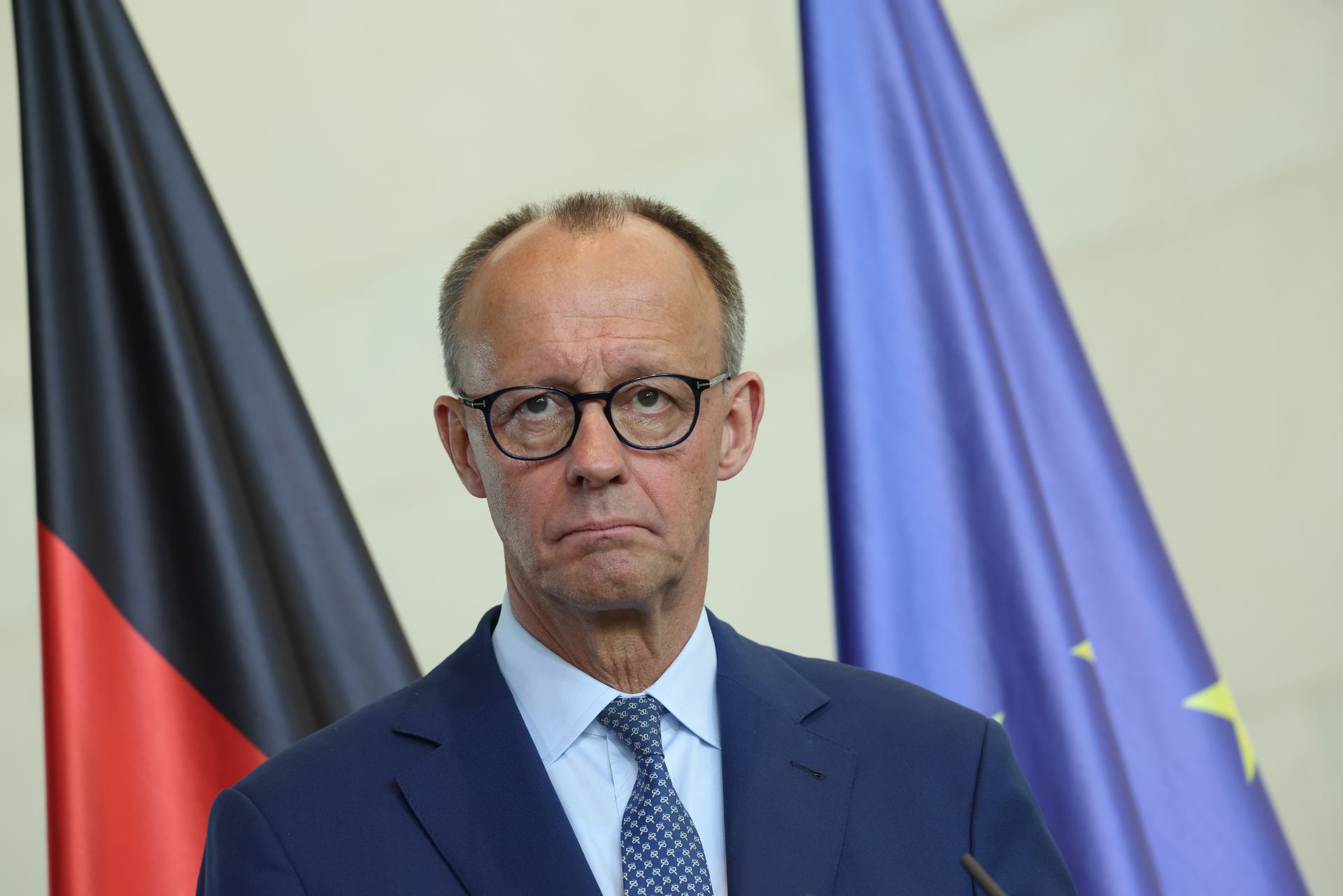

Four Alliance 90/Greens party members have sent an open letter to German Chancellor Friedrich Merz calling for a significant increase in military aid to Ukraine, Bild reported on July 5, citing a copy of the document.
The news comes as Russia’s expanded drone production has enabled Moscow to launch as many as 500 drones in a single night against Ukraine on multiple occasions each week.
The letter's authors — Robin Wagener, Sara Nanni, Sebastian Schafer, and Anton Hofreiter — demanded that certain budget items be adjusted, particularly regarding support for Ukraine. They believe that the planned increase in Germany's defense funding for Kyiv from $8.4 billion in 2024 to $9.8 billion in 2025 is insufficient, according to Bild.
The signatories emphasized the need to strengthen Ukraine's air defense systems urgently.
"Without further air defense and assured supplies, Russian dictatorship over Ukraine becomes more likely," the letter read.
The lawmakers also noted that the situation has deteriorated as Russia continues to carry out large-scale attacks on Ukraine, and the United States, for its part, has partially suspended its military aid.
The signatories reminded Merz that, thanks to the Greens party's support in the previous Bundestag, assistance to Ukraine had significantly increased.
Before becoming chancellor, Merz, elected for the CDU/CSU conservative alliance, signaled he could overturn the ban of his predecessor, Social Democrat Olaf Scholz, on delivering Taurus to Ukraine.
The Taurus is a powerful cruise missile capable of striking targets at a distance of 500 kilometers (300 miles), more than the long-range capabilities Ukraine received from other partners.
However, the German government has not approved sending Taurus missiles to Ukraine so far.
Ukraine has been using U.S.-made ATACMS for over a year, and U.K.-French Storm Shadow/SCALP for more than two, initially being allowed to deploy them only against Russian targets on Ukrainian territory.
Only in late 2024, the Biden administration and other allies eased the restrictions, allowing Ukraine to use long-range missiles against Russian military targets on Russian territory.
 The Kyiv IndependentNatalia Yermak
The Kyiv IndependentNatalia Yermak
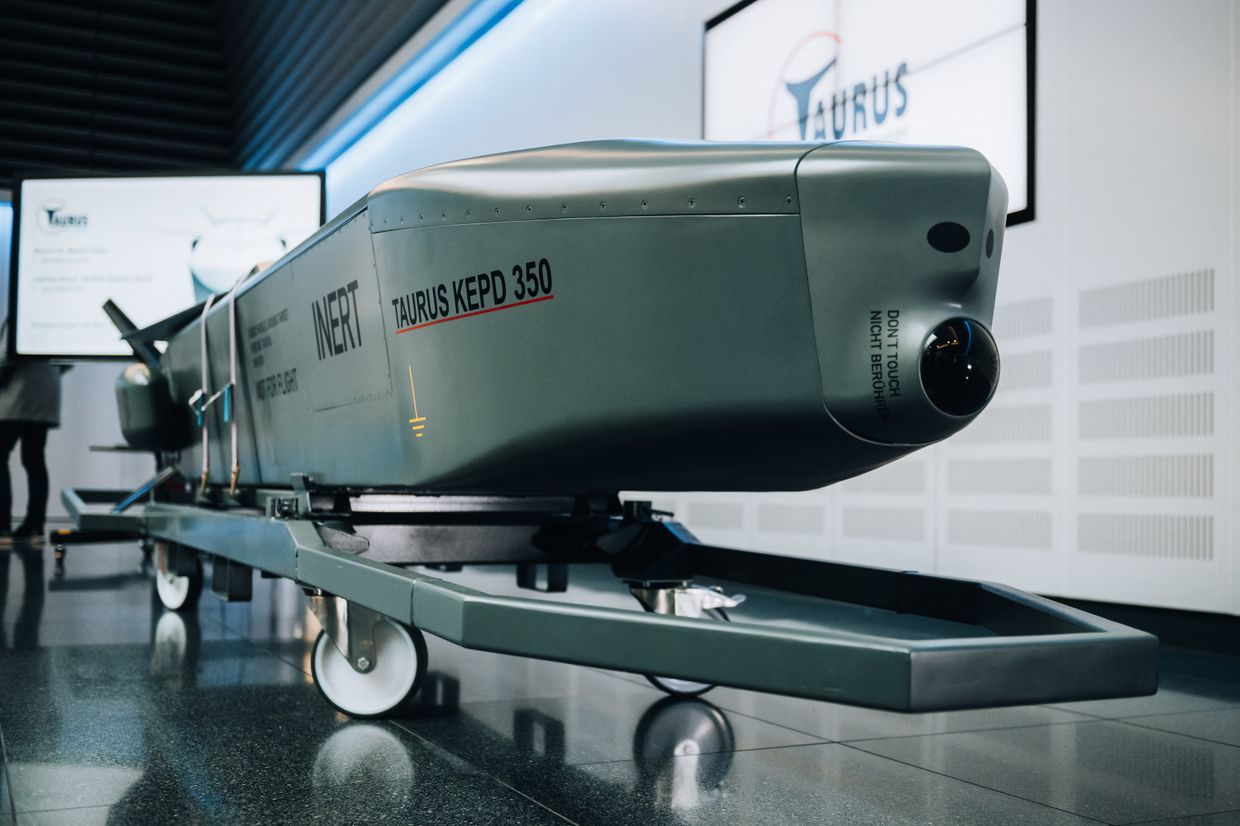

German Chancellor Friedrich Merz said on July 1 that the decision to supply Taurus cruise missiles to Ukraine remains under consideration but stressed that Germany will not become a party to the war.
"It has always been clear that if we supply the Taurus, this weapon will be used not by German soldiers, but by Ukrainians," Merz told Tagesschau. "By the way, the same applies to other cruise missiles supplied by the United Kingdom or France."
The Taurus is a powerful cruise missile capable of striking targets at a distance of 500 kilometers (300 miles) — a greater range than the long-range weapons Ukraine has received from other partners.
Speaking to the outlet, Merz highlighted the complexity of the Taurus system, noting that it requires extensive training before Ukrainian forces can operate it. In terms of range, speed, and payload, the Taurus missile is similar to the Storm Shadow, which is produced by MBDA’s French division. The key difference lies in the warhead design — Taurus can be programmed to detonate after penetrating fortified targets, such as bunkers or reinforced facilities.
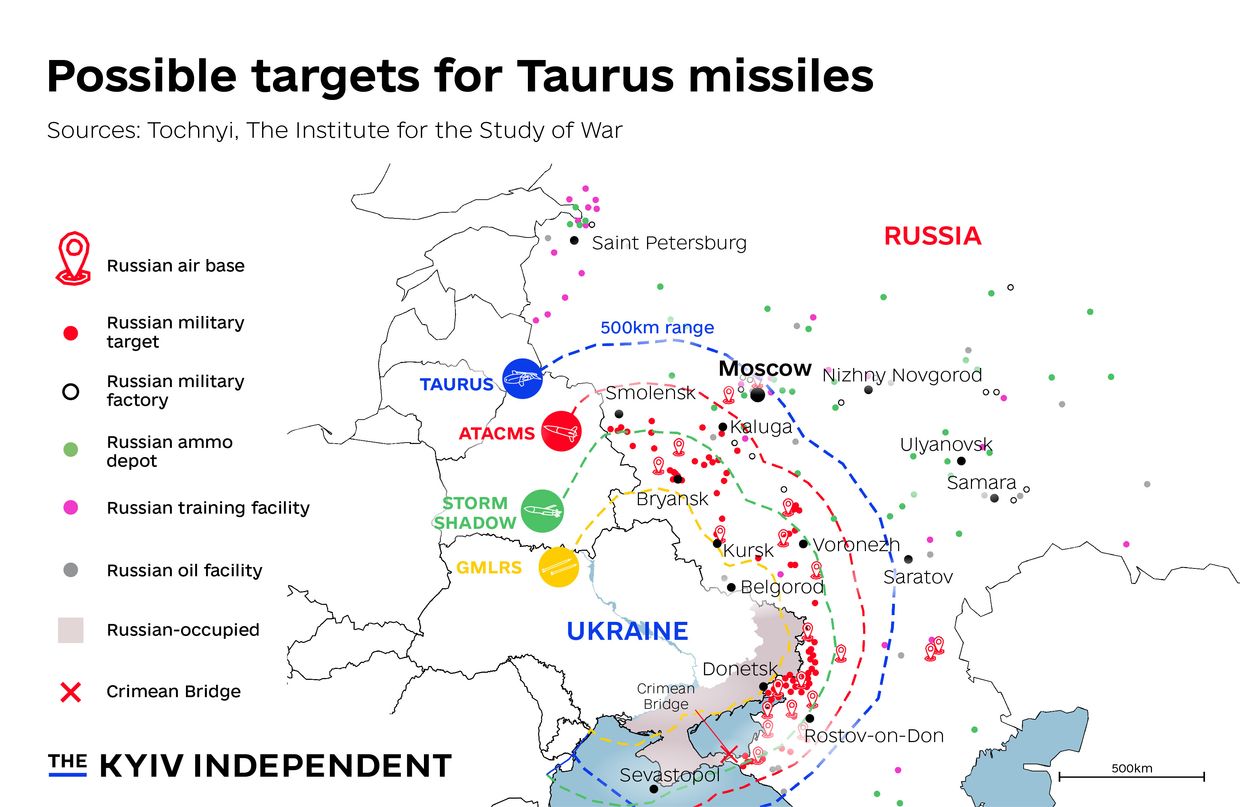
“The problem for us is that this system is extremely complex, and training soldiers on it takes at least six months. Are they already being trained? We haven't agreed on that yet,” he said. “I discussed this with President (Volodymyr) Zelensky, and I also raised it within the coalition. We haven’t started yet. It is and remains an option.”
The chancellor also added that Germany would no longer publicly disclose details about its military support to Ukraine in order to prevent Moscow from assessing the full scope of Western assistance.
Since Russia launched its full-scale invasion of Ukraine in February 2022, Germany has provided Kyiv with approximately 47.8 billion euros (about $51.8 billion) in total bilateral support, making it Ukraine’s second-largest country donor. This aid includes military equipment, humanitarian assistance, support for refugees, infrastructure repair, and financial aid for energy and winter relief, with military support alone totaling around 28 billion euros ($30 billion).
 The Kyiv IndependentAsami Terajima
The Kyiv IndependentAsami Terajima